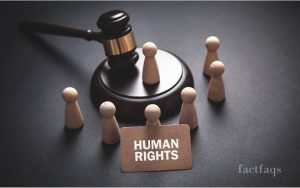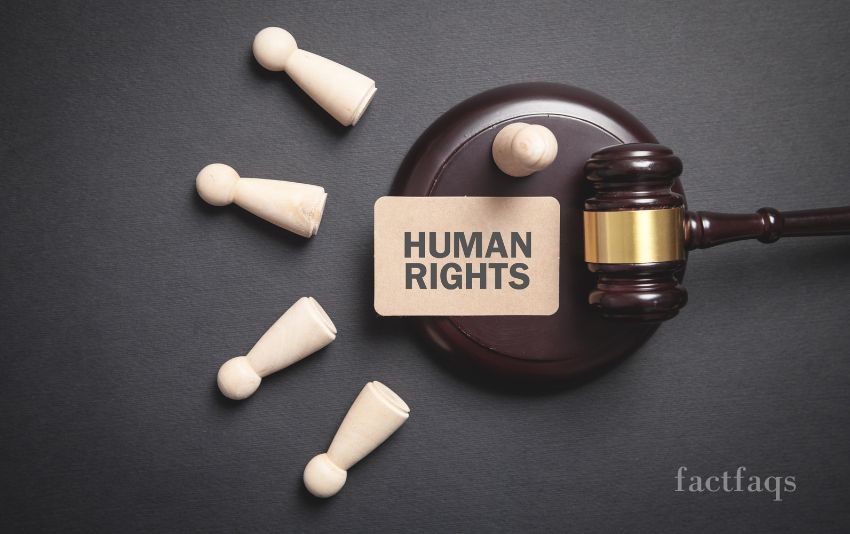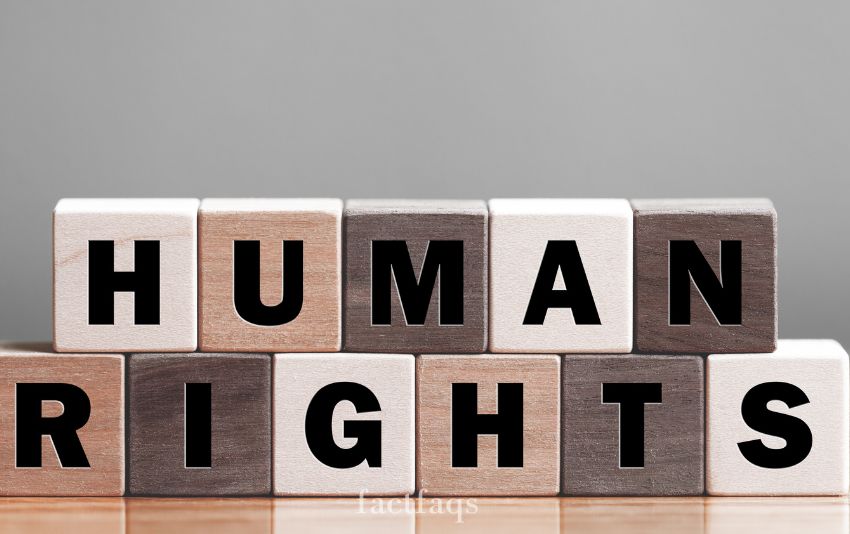Human rights are universal, inherent, fundamental, imprescriptible, inalienable, and indivisible. They include the right to life, a fair trial, freedom from torture, freedom of speech and religion, and the right to health, education, and an adequate standard of living.
These rights are based on principles of dignity, equality, and mutual respect that are shared across cultures and religions. Human rights are essential for ensuring that every person is treated with dignity and has the freedom to live a fulfilling life.
They protect individuals from abuse and provide a framework for promoting social justice and equality. Understanding and upholding human rights is critical for creating a just and inclusive society.
What Are Human Rights?
| Definition of human rights | Human rights are rights inherent to all human beings, regardless of their nationality, place of residence, sex, ethnicity, religion, language, or any other status. |
| Importance of human rights in society | Human rights play a crucial role in ensuring a just and inclusive society. They protect individuals from discrimination, oppression, and abuse, and promote equality, freedom, and dignity for all. |
| Characteristics of Human Rights |
|
Human rights issues encompass a wide range of violations and challenges, including issues such as discrimination, freedom of speech, torture, and access to education and healthcare.
Understanding and promoting human rights is crucial for creating a just and equitable society. Human rights education helps raise awareness and empower individuals to stand up against abuses and advocate for justice, equality, and human dignity.
The Universal Declaration of Human Rights serves as a foundational document for human rights advocacy and protection around the world, emphasizing the inherent worth and equal rights of all individuals.
It is important to acknowledge and address human rights violations to ensure the respect and fulfillment of human rights for everyone.

History Of Human Rights
| Characteristics of Human Rights |
|---|
| Human Rights are Universal |
| Human Rights are Inherent |
| Human Rights are Fundamental |
| Human Rights are Imprescriptible |
| Human Rights are Inalienable |
| Human Rights are Indivisible |
Human rights are principles of dignity, equality, and mutual respect that are shared across cultures, religions, and philosophies. They include the right to life, liberty, freedom from slavery and torture, freedom of opinion and expression, the right to work and education, and many more. Human rights are universal, meaning they apply to all individuals regardless of race, color, or religion. They are inherent to all human beings and cannot be taken away or waived. Human rights are considered fundamental to the well-being and dignity of every person. They are imprescriptible, meaning they cannot be lost over time. Additionally, human rights are inalienable, meaning they cannot be taken away or transferred. Finally, human rights are indivisible, meaning they are interconnected and interdependent. The characteristics of human rights highlight the importance of protecting and promoting these rights for the betterment of society.
Human Rights Violations
| Human Rights |
| Human rights are a set of principles that outline the basic rights and freedoms every individual is entitled to. These rights are based on the principles of dignity, equality, and mutual respect, which are shared across various cultures, religions, and philosophies. Human rights encompass a wide range of aspects, including the right to life and liberty, freedom from slavery and torture, freedom of opinion and expression, the right to work and education, and more. They are inherent to all individuals, regardless of their race, color, religion, or other characteristics. Human rights are fundamental and cannot be taken away or ignored. They are also indivisible, meaning that all rights are interconnected and equally important. Human rights violations refer to instances where these basic rights are infringed upon. This can include various types of violations, such as freedom of speech, freedom of religion, right to a fair trial, freedom from torture, and many more. Examples of major human rights violations include discrimination, inequality, oppression, and denial of basic freedoms. Promoting and protecting human rights is important as it ensures the well-being and dignity of every individual and contributes to a just and equal society. |
The Future Of Human Rights

|
Characteristics of Human Rights:
|
Human rights encompass a wide range of rights that protect individuals’ dignity, equality, and mutual respect. These rights are not restricted to specific cultures, religions, or philosophies, and they are applicable to everyone. Some of the fundamental human rights include the right to life, liberty, a fair trial, freedom from torture, freedom of speech and expression, freedom of religion, and the right to health, education, and an adequate standard of living.
When it comes to the future of human rights, there are emerging trends and potential developments that need to be considered. These trends include the increasing global recognition and acceptance of human rights, the advancements in technology affecting human rights issues, and the growing focus on intersectionality and the interconnectedness of different rights. However, these developments also bring challenges, such as addressing new forms of human rights violations and navigating the complexity of balancing conflicting rights.
Overall, human rights play a crucial role in promoting equality, justice, and dignity for all individuals, and it is important to continue educating and raising awareness about the importance of human rights to ensure their protection and implementation.
Also Read More:
Facts About People’s Behavior:
10 Key Facts About Human Rights

| 10 Key Facts about Human Rights | |
| Fact 1: Universal Declaration of Human Rights | Human rights are based on principles of dignity, equality, and mutual respect. The Universal Declaration of Human Rights is a landmark document that outlines the inalienable rights that everyone is entitled to as a human being, regardless of race, color, religion, or any other factor. It includes fundamental rights such as the right to life, fair trial, freedom from torture, freedom of speech, freedom of religion, and the right to health, education, and an adequate standard of living. |
| Fact 2: Civil and Political Rights | Civil and political rights include the right to life and liberty, freedom from slavery and torture, freedom of opinion and expression, and the right to a fair trial. These rights are essential for individuals to participate fully in society and exercise their democratic freedoms. |
| Fact 3: Economic, Social, and Cultural Rights | Economic, social, and cultural rights include the right to work, the right to education, the right to healthcare, and the right to participate in cultural and scientific life. These rights ensure that individuals have the opportunity to live a dignified life, free from poverty and discrimination. |
| Fact 4: Discrimination and Equality | Human rights promote equality and prohibit discrimination based on race, gender, religion, disability, or any other status. Everyone should be treated with dignity and respect, with equal access to opportunities and protection under the law. |
| Fact 5: Women’s Rights | Women’s rights are human rights. They encompass gender equality, freedom from violence and discrimination, and the right to participate fully in society, including in decision-making processes. Ensuring and promoting women’s rights is crucial for achieving overall gender equality. |
| Fact 6: Children’s Rights | Children have specific rights that protect their well-being, development, and protection. These rights include the right to education, health, protection from violence and exploitation, and the right to be heard. Protecting and promoting children’s rights is essential for their healthy growth and future success. |
| Fact 7: Indigenous Peoples’ Rights | Indigenous peoples have distinct rights that protect their culture, lands, and identity. These rights include self-determination, land and resource rights, the right to participation and consultation, and the right to preserve and promote their cultural heritage. Recognizing and respecting indigenous peoples’ rights is fundamental to achieving justice and equality for all. |
| Fact 8: LGBTQ+ Rights | LGBTQ+ rights focus on promoting equality, non-discrimination, and the right to live without fear of violence or persecution based on sexual orientation or gender identity. These rights include legal recognition of same-sex relationships, protection from discrimination, and access to appropriate healthcare and social services. |
| Fact 9: Freedom of Expression | Freedom of expression is a fundamental human right that allows individuals to express their thoughts, opinions, and ideas without censorship or restriction. This right is crucial for a free and democratic society, facilitating open dialogue, political participation, and the exchange of diverse perspectives. |
| Fact 10: Right to Education | The right to education ensures that every individual has access to quality education without discrimination. Education empowers individuals, promotes lifelong learning, and is essential for personal and social development, economic opportunities, and the realization of other human rights. |
Organizations Fighting For Human Rights
| Organizations Fighting for Human Rights |
| International human rights organizations |
| There are several international organizations dedicated to promoting and protecting human rights worldwide. Some of the most prominent ones include: |
| 1. United Nations Human Rights Council (UNHRC) |
| The UNHRC is an intergovernmental body responsible for addressing human rights violations and promoting human rights globally. It consists of 47 member states and holds regular sessions to discuss human rights issues. |
| 2. Amnesty International |
| Amnesty International is a non-governmental organization that works to protect human rights and promote justice worldwide. It conducts research, exposes human rights abuses, and advocates for changes in policies and practices. |
| 3. Human Rights Watch |
| Human Rights Watch is an international non-profit organization that investigates and reports on human rights abuses around the world. It works to hold governments and other entities accountable for their actions. |
| Non-governmental organizations (NGOs) working for human rights |
| In addition to international organizations, there are numerous non-governmental organizations (NGOs) that actively work to protect and promote human rights. These NGOs often focus on specific issues or regions and play a vital role in raising awareness, providing assistance, and advocating for change. |
Current Challenges And Debates In Human Rights
Human rights are universally recognized principles that protect the inherent dignity and equal rights of every individual, regardless of their nationality, race, religion, or other characteristics. These rights are fundamental to our existence and cannot be taken away. They include the right to life, liberty, and security of a person, freedom from torture and degrading treatment, freedom of thought, conscience, and religion, and the right to fair and just treatment in legal matters.
Contemporary issues in human rights are a subject of ongoing debate and challenge. Some of the key debates surrounding human rights include the balance between individual rights and collective rights, the enforcement and accountability for human rights violations, and the recognition of new rights in relation to emerging technologies and global challenges.
Examples of human rights issues include gender inequality, discrimination based on race or ethnicity, violations of freedom of expression and assembly, and the rights of refugees and migrants. These issues are complex and often require a multi-faceted approach to address.
It is essential to recognize the importance of human rights and to foster a culture of respect and inclusivity. By upholding and promoting human rights, we contribute to creating a more just and equitable society for all.
Frequently Asked Questions For 10 Facts About Human Rights
What Are 3 Interesting Facts About Human Rights?
Human rights are based on principles of dignity, equality, and mutual respect. They include the right to life, freedom from slavery and torture, freedom of opinion and expression, the right to work and education. They are universal, inherent, and fundamental, and apply to everyone regardless of race, religion, or other factors.
What Are The 5 Important Things About Human Rights?
Human rights are important because they protect the fundamental freedoms and dignity of every individual. They include the right to life, liberty, freedom from torture, freedom of speech, and the right to education and an adequate standard of living. These rights are universal, inherent, fundamental, imprescriptible, and inalienable.
What Are Human Rights 10?
Human rights are universal, inherent, fundamental, imprescriptible, inalienable, and indivisible. They include rights such as life, fair trial, freedom from torture, freedom of speech and religion, and the right to health, education, and an adequate standard of living. They are based on principles of dignity, equality, and mutual respect, shared across cultures and religions.
What Are The 10 Characteristics Of Human Rights?
The 10 characteristics of human rights are universal, inherent, fundamental, imprescriptible, inalienable, indivisible, interdependent, equal and non-discriminatory, indivisible, and progressive.
Faq 1: What Are Some Examples Of Human Rights Violations?
Human rights violations can include instances of discrimination, torture, unlawful detentions, censorship, and systemic oppression.
Conclusion
Human rights are universal and inherent to all individuals, regardless of race, religion, or background. They are based on the principles of dignity, equality, and mutual respect, and are essential for a just and fair society. Human rights encompass a range of freedoms, such as the right to life, freedom of speech, and access to education and healthcare.
These rights are inalienable, and their protection is crucial for promoting social justice and equality. By understanding and upholding human rights, we contribute to creating a world where every person is treated with respect and dignity.